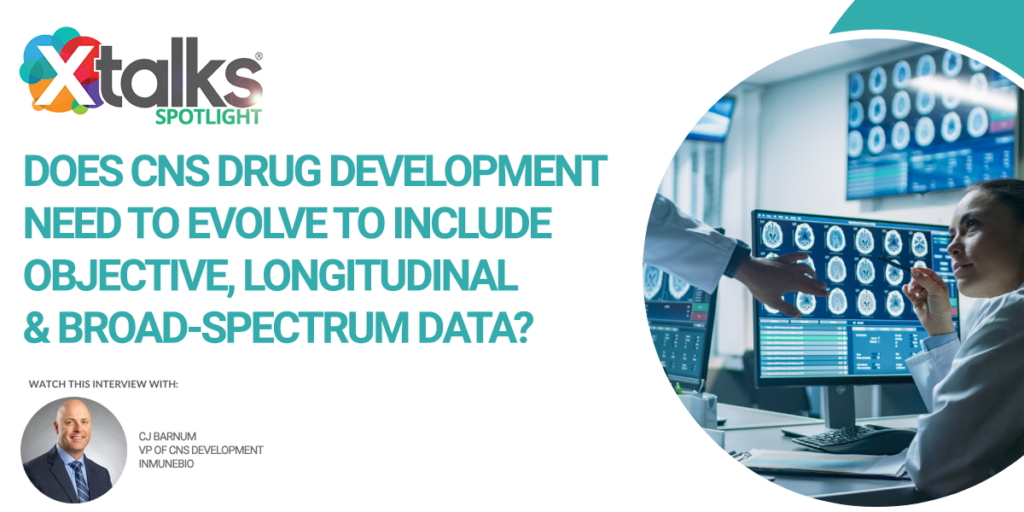To date, the lack of objective longitudinal measures in central nervous system (CNS) clinical studies has resulted in less than 6 percent of drugs in this space making it to market. Many of the validated cognitive assessments today are paper based, introducing the potential for bias and limiting ethnic and geographic diversity in clinical studies. Additionally, blood biomarkers only provide a snapshot in time and do not provide insight into cognitive function. There are other challenges facing CNS drug development, for example, higher-than-average patient drop-out rates due to the burden associated with attending clinical site visits.
What if your team could capture objective physiological and behavioral study data from a diverse group of patients on an ongoing basis without them having to leave the comfort of their own homes? Could you escalate the discovery of the next breakthrough treatment by streamlining your study timelines and costs?

INmune Bio, Inc.
In this Xtalks Spotlight edition, Xtalks spoke with Dr. CJ Barnum, Vice President of CNS Development at INmune Bio, Inc., about various aspects of CNS drug development.
Dr. Barnum discusses the challenges posed by infrequent measurements, the need for new approaches due to low therapy approval rates and specific hurdles in researching neurodegenerative and neuropsychiatric disorders.
Dr. Barnum is a neuroimmunologist with broad expertise across neurodegenerative and psychiatric diseases holding multiple positions in academia and industry.
RELATED XTALKS WEBINAR: Case Study: EEG Digital Biomarkers in Neuropsychiatric Clinical Studies
Live and On-Demand: Thursday, February 15, 2024, at 12pm EST (9am PST)
Register for this free webinar to learn how digital biomarkers have the potential to transform neuropsychiatry, enabling personalized treatment. The featured speakers will discuss how electroencephalogram (EEG)-derived digital biomarkers of functional, cognitive neurophysiology can generate scalable real-world data in neuropsychiatric clinical studies from translation to market.
Challenges in CNS Drug Development
Downsides of Infrequent Measurements and Assessments
In a recent webinar hosted by Xtalks and sponsored by Cumulus Neuroscience, a striking statistic emerged from the webinar survey: 47 percent of participants identified infrequent measurements and assessments as a primary obstacle in their CNS drug development efforts.
Dr. Barnum affirms the validity of these concerns. He emphasizes that the traditional approach to clinical assessments — comparing baseline data with endpoint results — is flawed, especially in the context of diseases like Alzheimer’s. Dr. Barnum articulates a core issue: the variability in a patient’s condition. Alzheimer’s, for instance, is characterized by fluctuating symptoms, with patients experiencing good and bad days. This variability can distort study outcomes, highlighting the need for more precise tools that are patient-friendly and provide longitudinal real-world data.
By capturing a broader spectrum of physiological and behavioral data over the course of a study, researchers can better understand the true impact of a CNS drug, accounting for day-to-day variations. The need is to move away from traditional, static models of assessment towards dynamic, responsive and patient-centric methods. Such advancements would not only enhance the accuracy of clinical trials but also offer deeper insights into the complexities of CNS diseases.
Concerns with Low CNS Drug Approval Rates and Homogenous Treatment Approaches
The low approval rates of CNS therapies, particularly in Alzheimer’s disease, are a cause for concern and signal a need for a paradigm shift in how clinical trials are conducted.
Dr. Barnum’s insights reveal a critical issue in current CNS drug development: the treatment of Alzheimer’s as a homogeneous disease. This approach, where all Alzheimer’s patients are recruited and grouped into the same study, fails to account for the individual variations in the disease. As Dr. Barnum notes, “If you have 100 different Alzheimer’s patients, you’ve got 100 different versions of Alzheimer’s.” The one-size-fits-all methodology overlooks the nuances of the disease, leading to ineffective clinical study strategies.
Drawing parallels with the field of oncology, Dr. Barnum suggests a more segmented approach to CNS therapy trials. Oncology has seen significant advancements by subdividing treatments based on specific cancer subtypes, like the multiple treatments for breast cancer tailored to different cancer characteristics. This approach has resulted in more effective treatments and could serve as a model to enable personalized medicine for patients with neurodegenerative diseases and neuropsychiatric conditions.
However, Dr. Barnum acknowledges that while in oncology you can biopsy a tumor, it is more difficult to characterize disease biology in the CNS space. Despite this, Dr. Barnum remains optimistic about the potential of new technologies, specifically digital biomarkers, including EEG, which can help to overcome these challenges.
Challenges in Researching Neurodegenerative and Neuropsychiatric Disorders
CNS clinical research, particularly in the field of neurodegeneration like Alzheimer’s disease and neuropsychiatric disorders such as treatment-resistant depression, presents unique and complex challenges. Dr. Barnum underscores the importance of developing targeted drug treatments and the role of innovative biomarkers in this process.
He offers an example from his experience, focusing on an investigational drug targeting inflammation in patients. Inflammation is a common factor across various diseases, but its manifestations and implications can differ significantly. This observation highlights the importance of not siloing diseases but rather developing tools that can traverse these boundaries.
A crucial element in this effort is the identification and implementation of new biomarkers and specific endpoints. “I’m convinced that there are tools out there, both biomarker and clinical assessment tools that will allow you to get the information in a shorter period of time with fewer patients,” says Dr. Barnum.
Dr. Barnum highlights the challenges of doing this, from ensuring adequate information for study design to navigating the scientific and regulatory landscapes. He points out that the responsibility for spearheading these changes often falls on small biotech companies, which, despite being a challenge, also opens avenues for innovation.
His insights reflect a broader call within the industry to embrace new technologies and patient-centric approaches to advance CNS clinical research.
The Role of EEG as a Biomarker
Electroencephalography (EEG) has been a pivotal tool in psychiatric research, but its integration into clinical trials has historically been challenging. Dr. Barnum highlights a significant advancement in EEG technology — the development of user-friendly, at-home devices. These innovations have made it possible for patients to self-administer cognitive and behavioral tests in conjunction with EEG, expanding the potential for longitudinal data collection in clinical studies. Dr. Barnum notes Cumulus Neurosciences, a company that has developed digital biomarkers, including at-home EEG, which can help provide an understanding of drugs’ effects.
The ability to collect EEG data throughout a study is a game-changer, offering insights into the efficacy of treatments and their impact on patient behavior and brain function. Barnum says that EEG, with these new tools, could be an excellent biomarker and a catalyst for more efficient research in understanding and treating neurodegeneration and psychiatric illnesses.
INmune Bio Study with Cumulus Neuroscience
In October 2023, INmune Bio presented data in collaboration with Cumulus Neuroscience at the 16th Clinical Trials on Alzheimer’s Disease (CTAD) annual meeting in Boston, which confirmed that it is feasible for patients living with mild to moderate Alzheimer’s to use the Cumulus Neuroassessment platform to provide objective, frequent and patient-centered tracking of functional neurophysiology that is reflective of cognitive function in their day-to-day life.
The implications of this study are far-reaching. By proving that patients with mild to moderate Alzheimer’s can provide objective and frequent data on their cognitive functions through the platform, a new avenue opens for patient-centered care. It allows for a deeper understanding of the disease progression and offers a potential pathway for personalized treatment strategies.
The study suggests that with the right tools, Alzheimer’s patients can actively participate in clinical studies from the comfort of their home. It also paves the way for further research, potentially leading to more innovative approaches in the diagnosis, monitoring and treatment of Alzheimer’s disease.
INmune Bio’s Innovative Approach to CNS Drug Development
INmune Bio adopts a novel approach to drug development, driven by the necessity of being a small biotech company and the need to prioritize patient well-being.
Dr. Barnum says INmune Bio recognizes the need for innovation when designing clinical trials. He stresses the importance of using relevant metrics that reflect a drug’s mechanism of action, rather than relying on traditional markers alone. This is part of their strategy to ensure that the trials are as effective and relevant as possible.
Additionally, INmune Bio adopts progressive trial designs and patient-centric approaches, opting for shorter studies when feasible to expedite the drug development process. This approach is not only vital for small biotech firms like INmune Bio but could also influence more efficient and effective drug development in the broader industry.
For more insights into CNS drug development, be sure to watch the Spotlight feature with Dr. Barnum. If you are interested in how to leverage digital biomarkers in neuropsychiatric clinical studies, register for the upcoming webinar Case Study: EEG Digital Biomarkers in Neuropsychiatric Clinical Studies sponsored by Cumulus Neuroscience.
This article was created in collaboration with the sponsoring company and the Xtalks editorial team.




Join or login to leave a comment
JOIN LOGIN